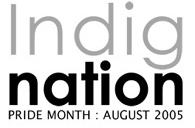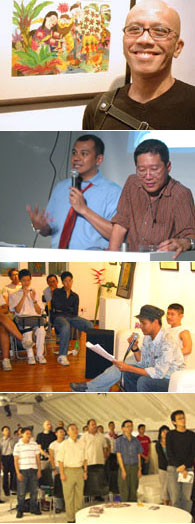The biggest credit must go to Clarence Singam. He had the original inspiration, and spent months either persuading various people and groups to organise events for August, or if they were already planning an event, to link it with the pride month. At times, it seemed hopeless when things moved ever so slowly, at other times frustrating when groups pulled out. But he persevered and gradually won others over by his determination and optimism.

IndigNation is a gay community response to the unreasonable ban on parties for gays and lesbians and heavy censorship of publications serving this community. It is a demonstration of the initiative and spirit of grass-roots civil society that the authorities say they want to encourage, but then go out of their way to suppress.
Furthermore, with the government lately demonising gay parties, and pointing fingers at the gay community for the uptrend in HIV incidence, there was a risk of rising homophobia. The community could do with a morale-booster.
In addition, PM Lee Hsien Loong had announced in August 2004 that indoor talks would no longer need licences from the police, and it was time for the gay and lesbian community to test this promise and use the opportunity so available.
Up to a week before the start of the pride month, it didn't have a name, and it took another bolt of inspiration to come up with a shortlist, which was then reduced by elimination to IndigNation.
Some detractors argued that a name like that made it sound as if the pride month was purely a testy response to the banning of the Snowball and Nation parties, when it had been planned as a celebration of other sides of gay and lesbian life. This argument is not without merit, though it cannot be denied that the pride month was at least indirectly
a response to the negative portrayal of the gay and lesbian community as a result of the government trying to justify its bans. Others were indignant about the brusque way in which the Affect05 concert, featuring Jason and deMarco, was banned, and the shoddy treatment of gay magazine,Manazine.
Equally importantly, it was important to reiterate that gay and lesbian Singaporeans are also part of the nation, and not to surrender the word "nation" to the discretionary and exclusive use by the State.
The pride month opened on 29 July 2005 with an exhibition of Martin Loh's children's illustrations at Utterly Art, and was followed in quick succession by a talk in Chinese by Tan Chong Kee on "Same-sex love in Classical Chinese Literature" on 2 August 2005. Then, "A night with gay poets" was held on 4 August 2005, where seven gay and lesbian poets gave a recital of their works (and that of a 8th poet as well).
In the second week, another art exhibition, "Solitary Desire" opened at Art Seasons, featuring works by Steve Chua and Ong Jenn Long.
After a brief lull to allow the noise of the State-organised National Day celebrations to pass, the talks resumed.
There was a double-bill on 16 August 2005, wherein Sheo S Rai gave a lecture on "Same-sex love in Classical South Asian Literature," followed by Russell Heng's "Where Queens Ruled! - A history of gay venues in Singapore." In his talk, Russell called on our community to excavate more of our own history. He observed that while we have a rich
local history, it has been poorly documented. It is particularly weak in photographic records.
Two days later, Safehaven's forum "Sex and the Christian gay person" was held, followed by "Exploring Paul, homosexuality and the Romans."

From the top: Martin Loh exhibited his illustrations for children's stories at Utterly Art. Photo courtesy: www.singaporesights.com; Clarence Singam (left) introduces Russell Heng (right) for his talk on the history of gay spaces; Alfian Sa'at reading his work at the poetry recital; Yisheng, another young poet, is seated at far right.; part of the crowd singing the national anthem at the close of The Quarterly.
National Anthem.
Other events in the fourth week are "S.A.D. Alienation," a mid-week party at Coccolatte, the theatre production "Boys," and the sixth anniversary bash by gay sports group, Adlus.
IndigNation was not just a series of events. It was also a set of tests for ourselves and for Singapore generally.
Would we face any trouble with the licensing authorities despite the Prime Minister's promise? We proved that the promise was real. Where in 2004 and all the years past, any talk with gay themes was routinely banned, in August 2005, they were held without interference. In fact, Chong Kee's talk, "Same-sex Love in Classical Chinese Literature" was originally prepared for the Lovers' Lecture Series (March 2004), but was not delivered then because the government refused a permit. Effectively, through IndigNation, the ban on that particular lecture has been reversed.
The poetry recital however required a permit, because it wasn't classed as a talk but as an arts event. Even so, the Media Development Authority expedited the permit despite a very late submission. They gave their approval little more than 24 hours after receiving the emailed application.
The other test was whether we would be able to get media publicity. This is a proxy for the government's attitude to gay initiatives. For example, it was noted by many during August 2004, that while the foreign media were reporting on the Nation '04 party, not a word was mentioned in the local media.
For IndigNation, things were different. There was quite positive coverage in both the Straits Times and Today at the start of the pride month, and a week later, another report in Today for the poetry recital.
The third test was applied, not to the government and the media, but to gay and lesbians in Singapore. The organisers adopted the policy of allowing all events to be photographed or videographed. In most events, even the audience could be photographed, and no announcement on this would be made. It was felt important to treat IndigNation events just like other public occasions in Singapore, for there can be no meaning to "pride month", if we're not out and proud.
It was heartening that almost everybody seemed undisturbed by being photographed, testifying to the maturity and confidence of the Singapore gay and lesbian community.
Much of the texts and photographs will in due course be archived at Pelangi Pride Centre for the public and historical record.
Alex Au is Singapore's most quoted gay and social activist, and co-founder of the pioneering gay e-mail forum, SiGNel and gay group People Like Us. The businessman-social commentator also runs yawningbread.org where he writes prolifically on gay and Singapore issues.











 Printable Version
Printable Version











Reader's Comments
Be the first to leave a comment on this page!
Please log in to use this feature.